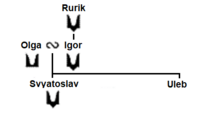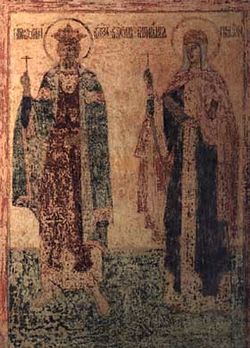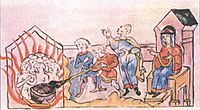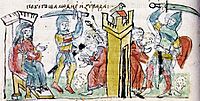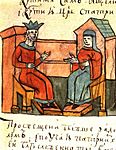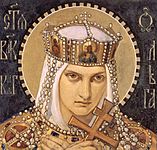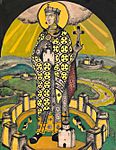Olga of Kiev facts for kids
Quick facts for kids SaintOlga of Kiev |
|
|---|---|
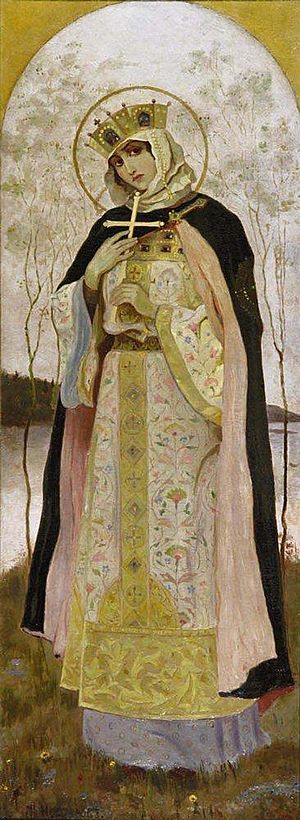
Saint Olga by Mikhail Nesterov
|
|
| Equal to the Apostles, Blessed Princess | |
| Born | c. 890–925 Pleskov or Vybuty, Kievan Rus' |
| Residence | Kiev, Kievan Rus' |
| Died | 11 July 969 Kiev, Kievan Rus' |
| Venerated in | Eastern Orthodoxy Roman Catholicism |
| Canonized | 1547, Moscov by Makaryev Sobors |
| Major shrine | Church of the Tithes |
| Feast | 11 July |
| Attributes | cross and church |
| Patronage | Widows, converts |
Olga (Old East Slavic: Вольга, romanized: Volĭga; Old Norse: Helga; Lith: Alge; Christian name: Elena; c. 890–925 – 969) was a regent of Kievan Rus' for her son Sviatoslav from 945 until 960. Following her baptism, Olga took the name Elenа (Old East Slavic: Ѡлена, romanized: Olena). She is known for her subjugation of the Drevlians, a tribe that had killed her husband Igor of Kiev. Even though it was her grandson Vladimir who converted the entire nation to Christianity, because of her efforts to spread Christianity through Rus', Olga is venerated as a saint in the Eastern Orthodox Church with the epithet "Equal to the Apostles". Her feast day is 11 July.
Contents
Life
Early life
While Olga's birthdate is unknown, it could be as early as 890 AD and as late as 925 AD. According to the Primary Chronicle, Olga was of Varangian (Viking) origin and was born in Pleskov. Little is known about her life before her marriage to Prince Igor I of Kiev and the birth of their son, Sviatoslav. According to Alexey Karpov, a specialist in the history of ancient Russia, Olga was no more than 15 years old at the time of her marriage. Igor was the son and heir of Rurik, founder of the Rurik dynasty. After his father's death, Igor was under the guardianship of Oleg, who had consolidated power in the region, conquering neighboring tribes and establishing a capital in Kiev. This loose tribal federation became known as Kievan Rus', a territory covering what are now parts of Russia, Ukraine, and Belarus.
The Drevlians were a neighboring tribe with which the growing Kievan Rus' empire had a complex relationship. The Drevlians had joined Kievan Rus' in military campaigns against the Byzantine Empire and paid tribute to Igor's predecessors. They stopped paying tribute upon Oleg's death and instead gave money to a local warlord. In 945, Igor set out to the Drevlian capital, Iskorosten, to force the tribe to pay tribute to Kievan Rus'. Confronted by Igor's larger army, the Drevlians backed down and paid him. As Igor and his army rode home, however, he decided the payment was not enough and returned, with only a small escort, seeking more tribute.
Upon his arrival in their territory, the Drevlians murdered Igor.
Regency
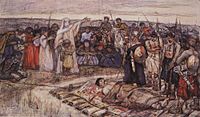
After Igor's death in 945, Olga ruled Kievan Rus' as regent on behalf of their son Sviatoslav. She was the first woman to rule Kievan Rus'. Little is known about Olga's tenure as ruler of Kiev, but the Primary Chronicle does give an account of her accession to the throne and her bloody revenge on the Drevlians for the murder of her husband as well as some insight into her role as civil leader of the Kievan people.
According to archeologist Sergei Beletsky, Knyaginya Olga, like all the other rulers before Vladimir the Great, was also using the bident as her personal symbol.
Drevlian Uprising
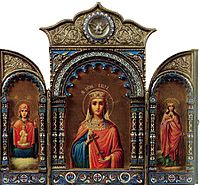
After Igor's death at the hands of the Drevlians, Olga assumed the throne because her three-year-old son Sviatoslav was too young to rule. The Drevlians, emboldened by their success in ambushing and killing the king, sent a messenger to Olga proposing that she marry his murderer, Prince Mal. Twenty Drevlian negotiators boated to Kiev to pass along their king's message and to ensure Olga's compliance. They arrived in her court and told the queen why they were in Kiev: "to report that they had slain her husband ... and that Olga should come and marry their Prince Mal." When the Drevlians returned the next day, they waited outside Olga's court to receive the honor she had promised. When they repeated the words she had told them to say, the people of Kiev rose up, carrying the Drevlians in their boat. The ambassadors believed this was a great honor as if they were being carried by palanquin. The people brought them into the court where they were dropped into a trench that had been dug the day before under Olga's orders where the ambassadors were buried alive. It is written that Olga bent down to watch them as they were buried and "inquired whether they found the honor to their taste."
Olga then sent a message to the Drevlians that they should send "their distinguished men to her in Kiev, so that she might go to their Prince with due honor." The Drevlians, unaware of the fate of the first diplomatic party, gathered another party of men to send "the best men who governed the land of Dereva." When they arrived, Olga commanded her people to draw them a bath and invited the men to appear before her after they had bathed. When the Drevlians entered the bathhouse, Olga had it set on fire from the doors, so that all the Drevlians within burned to death.
Olga sent another message to the Drevlians, this time ordering them to "prepare great quantities of mead in the city where you killed my husband, that I may weep over his grave and hold a funeral feast for him." When Olga and a small group of attendants arrived at Igor's tomb, she did indeed weep and hold a funeral feast. The Drevlians sat down to join them. She ordered her followers to kill them, "and went about herself egging on her retinue to the massacre of the Drevlians." According to the Primary Chronicle, five thousand Drevlians were killed on this night, but Olga returned to Kiev to prepare an army to finish off the survivors.
The initial conflict between the armies of the two nations went very well for the forces of Kievan Rus', who won the battle handily and drove the survivors back into their cities. Olga then led her army to Iskorosten (what is today Korosten), the city where her husband had been slain, and laid siege to the city. The siege lasted for a year without success when Olga thought of a plan to trick the Drevlians. She sent them a message: "Why do you persist in holding out? All your cities have surrendered to me and submitted to tribute, so that the inhabitants now cultivate their fields and their lands in peace. But you had rather die of hunger, without submitting to tribute."
The Drevlians responded that they would submit to tribute, but that they were afraid she was still intent on avenging her husband. Olga answered that the murder of the messengers sent to Kiev, as well as the events of the feast night, had been enough for her. She then asked them for a small request: "Give me three pigeons ... and three sparrows from each house." The Drevlians rejoiced at the prospect of the siege ending for so small a price, and did as she asked.
Olga then instructed her army to attach a piece of sulphur bound with small pieces of cloth to each bird. At nightfall, Olga told her soldiers to set the pieces aflame and release the birds. They returned to their nests within the city, which subsequently set the city ablaze. As the Primary Chronicle tells it: "There was not a house that was not consumed, and it was impossible to extinguish the flames, because all the houses caught fire at once." As the people fled the burning city, Olga ordered her soldiers to catch them, killing some of them and giving the others as slaves to her followers. She left the remnant to pay tribute.
Governance
Olga remained regent ruler of Kievan Rus' with the support of the army and her people. She changed the system of tribute gathering (poliudie) in the first legal reform recorded in Eastern Europe. She continued to evade proposals of marriage, defended the city during the Siege of Kiev in 968, and saved the power of the throne for her son.
After her dramatic subjugation of the Drevlians, the Primary Chronicle recounts how Olga "passed through the land of Dereva, accompanied by her son and her retinue, establishing laws and tribute. Her trading posts and hunting-reserves are there still." As queen, Olga established trading-posts and collected tribute along the Msta and the Luga rivers. She established hunting grounds, boundary posts, towns, and trading-posts across the empire. Olga's work helped to centralize state rule with these trade centers, called pogosti, which served as administrative centers in addition to their mercantile roles. Olga's network of pogosti would prove important in the ethnic and cultural unification of the Rus' people, and her border posts began the establishment of national boundaries for the kingdom.
During her son's prolonged military campaigns, she remained in charge of Kiev, residing in the castle of Vyshgorod with her grandsons.
Christianity
The Primary Chronicle does not go into additional detail about Olga's time as regent, but does tell the story of her conversion to Christianity and subsequent effect on the acceptance of Christianity in Eastern Europe.
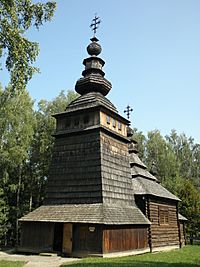
Conversion
In the 950s, Olga traveled to Constantinople, the capital of the Byzantine Empire, to visit Emperor Constantine VII. Once in Constantinople, Olga converted to Christianity with the assistance of the Emperor and the Patriarch. While the Primary Chronicle notes that Olga was christened with the name "Helena" after the ancient Saint Helena (the mother of Constantine the Great), Jonathan Shepard argues that Olga's baptismal name comes from the contemporary emperor's wife, Helena. The observation that Olga was "worthy to reign with him in his city" suggests that the emperor was interested in marrying her. While the Chronicle explains Constantine's desire to take Olga as his wife as stemming from the fact that she was "fair of countenance and wise as well," marrying Olga could certainly have helped him gain power over Rus'.
The Chronicle recounts that Olga asked the emperor to baptize her. Though her desire to become Christian may have been genuine, this request was also a way for her to maintain political independence.
Francis Butler argues that the story of the proposal was a literary embellishment, describing an event that is highly unlikely to have ever actually occurred. In fact, at the time of her baptism, Constantine already had an empress. In addition to uncertainty over the truth of the Chronicle's telling of events in Constantinople, there is controversy over the details of her conversion to Christianity. According to Russian sources, she was baptized in Constantinople in 957. Byzantine sources, however, indicate that she was a Christian prior to her 957 visit.
It seems likely that she was baptized in Kiev around 955 and, following a second christening in Constantinople, took the Christian name Helen. Olga was not the first person from Rus' to convert from her pagan ways-- there were Christians in Igor's court who had taken oaths at the St. Elias Church in Kiev for the Rus'–Byzantine Treaty in 945--but she was the most powerful Rus' individual to undergo baptism during her life.
Efforts to Christianize Kievan Rus'
The Primary Chronicle reports that Olga received the Patriarch's blessing for her journey home, and that once she arrived, she unsuccessfully attempted to convert her son to Christianity:This passage highlights the hostility towards Christianity in Kievan Rus' in the tenth century. In the Chronicle, Sviatoslav declares that his followers would "laugh" if he were to accept Christianity. While Olga tried to convince her son that his followers would follow his example if he converted, her efforts were in vain. However, her son agreed not to persecute those in his kingdom who did convert, which marked a crucial turning point for Christianity in the area. Despite the resistance of her people to Christianity, Olga built churches in Kiev, Pskov, and elsewhere.
Relations with the Holy Roman Emperor
Seven Latin sources document Olga's embassy to Holy Roman Emperor Otto I in 959. The continuation of Regino of Prüm mentions that the envoys requested the emperor to appoint a bishop and priests for their nation. The chronicler accuses the envoys of lies, commenting that their trick was not exposed until later. Thietmar of Merseburg says that the first archbishop of Magdeburg, Adalbert of Magdeburg, before being promoted to this high rank, was sent by Emperor Otto to the country of the Rus' (Rusciae) as a simple bishop but was expelled by pagan allies of Sviatoslav I. The same data is repeated in the annals of Quedlinburg and Hildesheim.
In 2018, Russian historian and writer Boris Akunin pointed out the importance of a 2-year gap between invitation and arrival of bishops: "The failure of Olga's Byzantine trip has inflicted a severe blow to her party. The Grand Knyaginya made a second attempt to find a Christian patron, now in the West. But it seems, in the period between the sending of the embassy to Emperor Otto in 959 and the arrival of Adalbert in Kiev in 961, a bloodless coup took place. Pagan party prevailed, the young Sviatoslav pushed his mother into the background, and that's why the German bishops had to return empty-handed."
According to Russian historian Vladimir Petrukhin, Olga invited the Roman rite bishops because she wanted to motivate Byzantine priests to catechize the Rus' people more enthusiastically, by introducing competition.
Death
According to the Primary Chronicle, Olga died from illness in 969, soon after the Pechenegs' siege of the city. When Sviatoslav announced plans to move his throne to the Danube region, the ailing Olga convinced him to stay with her during her final days. Although he disapproved of his mother's Christian tradition, Sviatoslav heeded Olga's request that her priest, Gregory, conduct a Christian funeral without the ritual pagan burial feast. Her tomb remained in Kiev for over two centuries, but was destroyed by the Mongolian-Tatar armies of Batu Khan in 1240.
Legacy
Sainthood
At the time of her death, it seemed that Olga's attempt to make Kievan Rus' a Christian territory had been a failure. Nonetheless, Olga's Christianizing mission would be brought to fruition by her grandson, Vladimir, who officially adopted Christianity in 988. In 1547, nearly 600 years after her 969 death, the Russian Orthodox Church named Olga a saint. Because of her proselytizing influence, the Eastern Orthodox Church, the Ruthenian Greek Catholic Church, and the Ukrainian Greek Catholic Church call Olga by the honorific Isapóstolos, "Equal to the Apostles". Olga's feast day is July 11, the date of her death. In keeping with her own biography, she is the patron of widows and converts.
Honorific title "Equal to the Apostles" was first given to her on the initiative of Archimandrite Innokenty (Prosvirnin) in the 80s of the 20th century.
Olga is venerated as saint in East Slavic-speaking countries where churches uses the Byzantine Rite: Eastern Orthodox Church (especially in Russian Orthodox Church), Greek Catholic Church (especially in the Ukrainian Greek Catholic Church), in churches with Byzantine Rite Lutheranism, and among Western Catholics in Russia.
Feast Day
- 11 July – main commemoration (death anniversary),
Fixed Feast Day (Synaxes)
- 25 May – Synaxis of Saints of Volhynia (ROCOR and Greek Orthodox Church),
- 15 July – Synaxis of All Saints of Kiev (ROC),
- 10 October – Synaxis of Saints of Volhynia (ROC),
Moveable Feast Day (Synaxes)
- Synaxis of Saints of Pskov – movable holiday on the 3rd Sunday of Pentecost,
Churches and monuments
- Ukraine
- Cathedral of St. Olha, Kyiv (inaugurated 2010)
- Church of Sts. Olha and Elizabeth, Lviv
- Church of Volodymyr and Olha, Khodoriv
- Church of Sts. Volodymyr and Olha, Podusiv, Lviv Raion, Lviv Oblast
- Saint Volodymyr and Olha church, Staryi Dobrotvir, Chervonohrad Raion, Lviv Oblast
- Church of Saints Volodymyr and Olha, Birky, Yavoriv Raion, Lviv Oblast
- Church of Saints Volodymyr and Olha, Horodok, Lviv Oblast
- Saint Olga Orthodox church in Korosten, Zhytomyr Oblast
- Monument of St. Olga by Vyacheslav Klykov, Pskov (2003).
- Monument of St. Olga by Zurab Tsereteli, Pskov (2003).
- Olga bridge in Pskov.
- St. Olga's chapel in Pskov.
- Princess Olga Airport in Pskov (since 2019, through a win in a poll against Aleksandr Nevsky).
- Monument of St. Olga in Vladimir.
- Monument of St. Olga in Moscow.
- St. Olga is present on the Millennium of Russia monument in Veliky Novgorod.
- St. Olga Roman Catholic Cathedral in Lyublino, Moscow (inaugurated 2003).
- St. Olga Equal-to-apostles Russian Orthodox Cathedral in Ostankino, Moscow (inaugurated 2014).
- St. Olga Equal-to-apostles Russian Orthodox Cathedral in Solntsevo, Moscow (inaugurated 2015).
- St. Olga Equal-to-apostles Russian Orthodox Cathedral in Olga, Primorje.
- United States
- Sts. Volodymyr and Olha Ukrainian Catholic Church, Chicago
- Canada
- Saints Vladimir and Olga Ukrainian Catholic Cathedral and Parish Hall, Winnipeg, Manitoba
- Saints Vladimir and Olga Ukrainian Catholic Church, Dauphin, Manitoba
- Saints Vladimir and Olga Ukrainian Catholic Church, Windsor, Ontario
- Australia
- Saints Volodymyr and Olha Church, Woodville, South Australia
Arts and literature
In 1981 a new ballet based on Olga's life was composed to commemorate the 1500th anniversary of the city of Kyiv.
Gallery
- Illuminations from the Radziwiłł Chronicle
-
Fourth revenge of Olga: Burning of Derevlian capital Iskorosten
- Portraits
-
Nicholas Roerich's Saint Olga (1915)
See also
 In Spanish: Olga de Kiev para niños
In Spanish: Olga de Kiev para niños
- Princess Olga Pskov Airport
- Order of Princess Olga (established in Ukraine in 1997)
- Olga Bay and Olga, Russia
- Christianization of Kievan Rus'
- A Perfect Absolution - concept album by French band Gorod about Olga of Kiev


